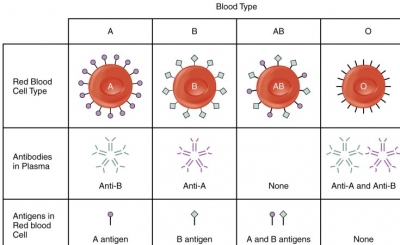
There are four main types of blood group – A, B, AB, and O. The group mostly depends on special makers on the surface of red blood cells, called antigens. These help the body to identify blood cells that do not belong to you. Patients who need a blood transfusion must receive the right blood group, or the body will reject the donated blood, making them even more unwell.
Type A
This can be donated to those with type A or AB blood groups. The surface of the red blood cells contains A antigen, and the plasma has anti-B antibody. Anti-B antibody would attack blood cells that contain B antigen.
Type B
This can be donated to those with type B or AB blood. The surface of the red blood cells contains B antigen, and the plasma has anti-A antibody. Anti-A antibody would attack blood cells that contain A antigen.
Type AB
This blood can only be donated to other people with the AB blood type. The red blood cells have both A and B antigens, but the plasma does not contain anti-A or anti-B antibodies. Individuals with type AB can receive any ABO blood type.
Type O
These blood cells have no antigens so can be donated to people of any blood group. The plasma contains both anti-A and anti-B antibodies, but the surface of the red blood cells does not contain any A or B antigens. Since these antigens are not present, a person with any ABO blood type can receive this type of blood.
Picture Credit : Google



